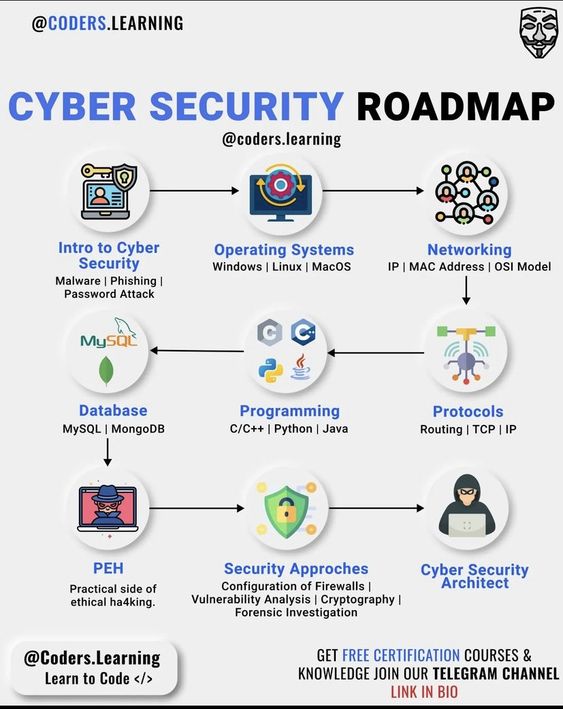Introduction to Cybersecurity Analyst Roadmap
A cybersecurity analyst is responsible for protecting an organization’s computer networks and systems from cyber threats. This involves identifying vulnerabilities, implementing security measures, and responding to security incidents. To become a successful cybersecurity analyst, you need to follow a well-defined Cybersecurity roadmap.
Learn the Fundamentals
Before you start delving into the specifics of data engineering, it’s important to have a solid foundation in computer science and programming. You’ll need to understand data structures, algorithms, and programming languages like Python, Java, and SQL. Make sure you’re familiar with database management systems, distributed computing, and cloud computing as well.
Step 1.1: Fundamentals of Programming
Before diving into the specifics of development, it’s essential to learn the fundamentals of programming. Familiarize yourself with basic programming concepts such as variables, data types, control structures, functions, and object-oriented programming. In Coursaya, we offer plenty of courses covering nearly every possible field.
We recommend the following courses:
Data Structures: Data structures are ways of organizing and storing data. They include arrays, linked lists, stacks, queues, trees, and graphs. Understanding data structures is important because they can help you efficiently manage large amounts of data and perform complex operations.
We recommend the following FREE courses:
Algorithms: Algorithms are a set of instructions that solve a particular problem or perform a specific task. They include search algorithms, sorting algorithms, graph algorithms, and many others. Understanding algorithms is important because it can help you solve problems efficiently and optimize your code.
We recommend the following courses:
-
Algorithms for Searching, Sorting, and Indexing
-
Greedy Algorithms, Minimum Spanning Trees
-
Analysis of Algorithms
-
Advanced Algorithms and Complexity
To learn programming fundamentals, you can start with an introductory programming course or tutorial in a language of your choice. Some popular languages for beginners include Python, Java, and Ruby. Once you have a basic understanding of programming concepts, you can start learning about data structures, algorithms, and object-oriented programming.
Core Skills for a Cybersecurity Analyst
To become a cybersecurity analyst, you need to have a solid foundation in computer science, networking, and information security. You should also have experience in risk management, security analysis, and incident response. Additionally, skills in scripting and programming are essential.
We Recommend the following courses:
-
Cyber Security Fundamentals
-
Introduction to Cyber Security Specialization
-
Introduction to Cyber Security Specialization
Understanding Cybersecurity Concepts and Principles
To become a proficient cybersecurity analyst, it’s important to have a solid understanding of cybersecurity concepts and principles. This includes understanding the various types of cyber threats, the tools and techniques used by cybercriminals, and the different types of security measures that can be implemented to protect computer systems.
We Recommend the following courses:
-
Advanced Python Scripting for Cybersecurity
-
Cybersecurity and Mobility
-
Cybersecurity for Tech Professionals
Implementing Security Controls
Cybersecurity analysts are responsible for implementing security controls to protect an organization’s computer systems. This involves configuring firewalls, intrusion detection systems, and other security technologies to detect and prevent cyber attacks. Cyber analysts must also be able to develop and implement security policies and procedures to ensure that security controls are effective.
Analyzing Cybersecurity Threats
Analyzing cybersecurity threats is a critical part of a cybersecurity analyst’s job. This involves monitoring network traffic, analyzing logs, and conducting vulnerability assessments to identify potential security risks. Cybersecurity analysts must also be able to respond quickly to security incidents to prevent further damage.
Responding to Security Incidents
Responding to security incidents is an essential part of a c analyst’s job. This involves identifying the source of the security breach, containing the damage, and restoring normal operations. Cybersecurity analysts must also be able to develop and implement incident response plans to ensure that security incidents are handled effectively.
Managing Cybersecurity Projects
Managing cybersecurity projects involves coordinating the efforts of different teams and stakeholders involved in the project. Cybersecurity analysts must be skilled in project management and have experience in managing cybersecurity projects. This includes understanding the project requirements, allocating resources, and ensuring that the project is delivered on time and within budget.
We Recommend the following FREE courses:
-
Cybersecurity Capstone Project
-
Detecting and Mitigating Cyber Threats and Attacks
-
Advanced Python Scripting for Cybersecurity
Maintaining and Improving Cybersecurity Systems
Maintaining and improving cybersecurity systems requires continuous monitoring and management. This includes regular system updates, vulnerability scanning, and penetration testing. Cybersecurity analysts must also be able to identify and resolve performance issues and optimize the performance of the cybersecurity systems.
Developing a Cybersecurity Analyst Career Path
Developing a career path in cybersecurity involves acquiring new skills- which we are trying to provide in this roadmap, working on challenging projects, and continuously improving your knowledge of cybersecurity technologies. This may involve earning certifications in specific technologies, attending industry conferences, or pursuing higher education degrees.


